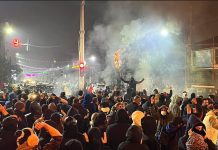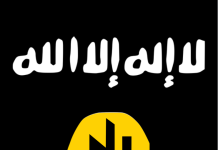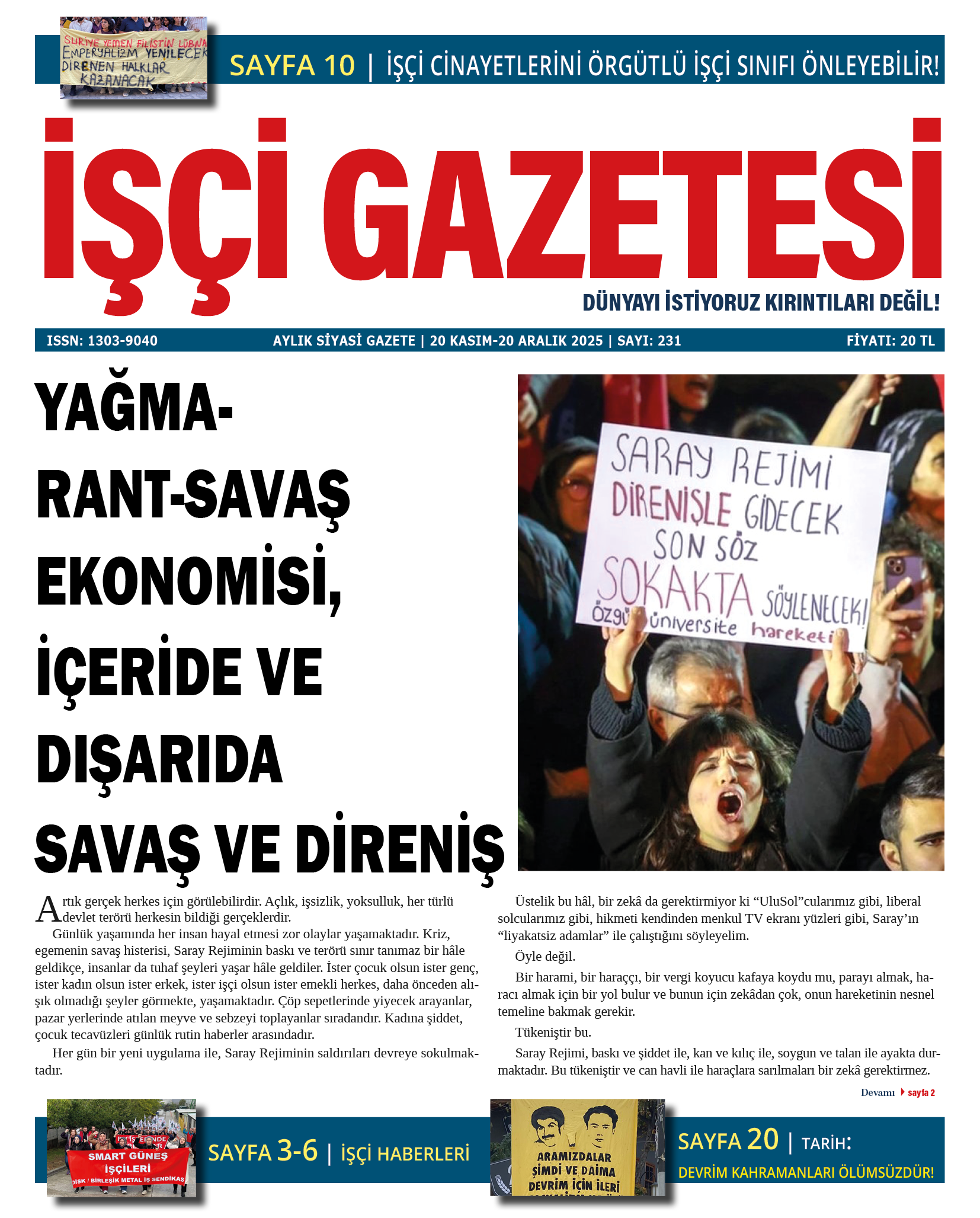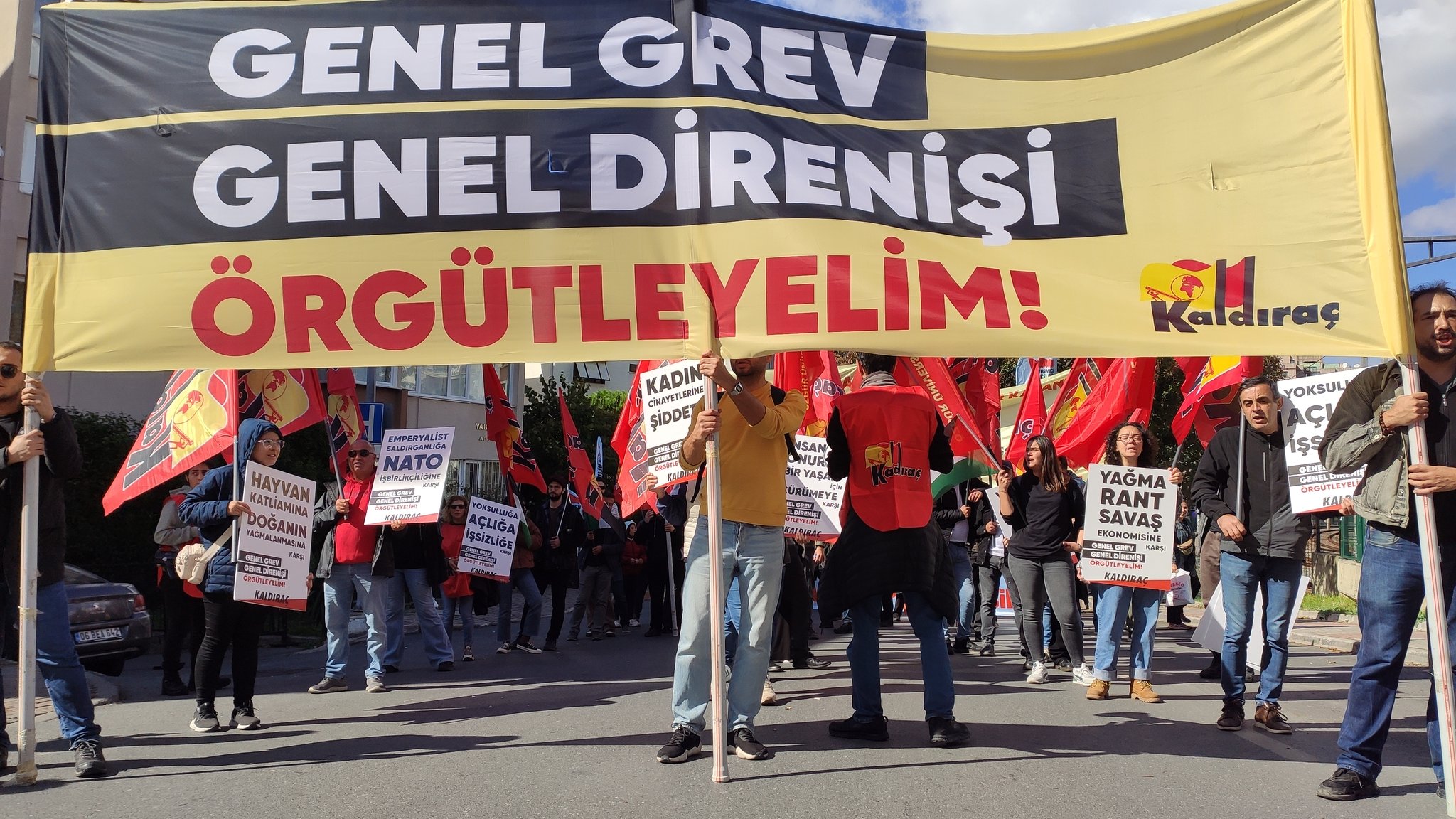Aysun Sadıkoğlu
July 2025 – Kaldıraç Issue 288
Our so-called educated ones love to be called “intellectuals” or “experts.” They know a lot and yet they are just as “ignorant” as they are knowledgeable. Such vast and deep ignorance can only be produced through education. That is their kind. Whenever a subject comes up and they claim to be “enlightening”, what actually begins is an effort to spread darkness. These are the ones who describe war as the hysteria of a single person or of certain individuals. War, they say, is “evil”, and evil men ignite it. That’s how they put it. In this way, war is presented to us as the work of “mad, deranged” men. This is the most effective way to protect the war barons; it absolves the system. They cover up the true functioning of the system with darkness. To say that these experts are simply “wrong” is not enough.
It is not merely wrong; but also a form of service to the war barons, deliberately designed to sow confusion.
And if war is portrayed in this way, then peace becomes the work of reasonable, sensible people.
Yet both war and peace have their own types. Isn’t that so? Are you familiar with imperialist wars of plunder? Of course you are. For example, the US waged a war of plunder in Iraq. The US and the West, through the hands of Israel, are waging a war of genocide and partition in Palestine. In Algeria, France waged a colonial war and of course those who fought against it organized a just war, a resistance, a war for freedom. Now, are the two sides of these wars the same? Of course not.
War has always emerged as the means by which the rulers impose their will. And every war waged against the rulers—despite all its shortcomings—has always been a just war. Does peace, for instance, mean the same thing for colonialist France in Algeria as it does for the resistance organization fighting against it? Of course not.
Since the birth of slave society—that is, since the emergence of classes, the rise of the state, and the appropriation of the means of production—the world has witnessed many bloody wars.
But the wars that are called “world wars” belong to capitalism, to the age of imperialism, to the world of the monopoly bourgeoisie. Capitalist imperialism emerged with the development of monopolization that began in the 1870s and the First World War followed in its wake. The First World War arose as a struggle among imperialist colonizers—who had already divided the world among themselves—for a new repartition of the world. The staging of events is another matter, but the war itself was one undertaken by the imperialist powers to redivide the world. The world had already been divided in terms of land and markets; thus, only a redivision was possible, and so it happened. The Second World War had a dual character. The Soviet Union, beginning with the October Revolution of 1917, had started to create a world outside of capitalism. For all monopolies, for all capital, this meant both a “loss of markets” and a threat to their future. For this reason, they wanted, on the one hand, to strangle the Soviet Union, while on the other hand, the imperialist West had launched once again into an internal struggle to redivide the world.
These two wars, known as “world wars,” belong to capitalism and its imperialist era. The West has tried every means to plunder Latin America, the Middle East, Asia and Africa and has staged every kind of savagery. The history of England, France, the Netherlands, the United States and others is full of these plundering wars and atrocities. And they have always referred to it as “bringing civilization.” Those who declare themselves “civilized” have not hesitated to resort to every form of brutality. Wherever you look in the world, you see the traces of this bloody colonialism, which has persisted for generations and continues to this day.
And nowadays, we are living in the period of the Third World War. If someone comes forward and says, “it has not yet fully turned into a world war,” there is no harm in that—on the condition that the fact that this is indeed a world war is acknowledged. Some may also say that we are right on the eve of this war. These are points that can be debated today.
Yet we recognize that (1) this war is mainly between five imperialist powers. These five imperialist powers are the US, Germany, Japan, England and France. Powers such as Italy, the Netherlands, Canada and the like are also involved in this war. But essentially, the war is being organized by the desires of these five powers. (2) The decisive aspect of this war is the process of dismantling the hegemony of the United States, the hegemonic power of the system. Although this process has economic roots in the past, the anti-communist imperialist alliance against the USSR was secretly waging this war. The dissolution of the USSR brought this war to the surface in all its aspects. “The great reset” is actually the desire to rebuild the capitalist world economic system established after World War II under US hegemony and this desire has been voiced by England. More than 20 years have passed since then. (3) The US has military superiority over its rivals. For this reason, the US has engaged in military attacks and local wars. The invasion of Afghanistan, the Iraq war, etc. are the result of this. However, these wars did not prevent the dissolution of US hegemony. On the contrary, despite some military successes, the dissolution of hegemony accelerated. Therefore, in order to keep its other imperialist allies under its hegemony, the US created specific enemies such as ISIS. It deployed gangs it had recruited for the “Green Belt” project, which had been put into action to encircle the USSR, as Islamic gangs. This is the Syrian war. And at this point, Russia stepped in. (4) When the USSR collapsed, Russia and China assumed that, as two major powers, they would join the G7 club. But that wasn’t the case. Rulers don’t want new partners at the table of power and that’s what they did. The Syrian war brought this process into sharp focus. Following their losses in the Syrian war, the US administration moved to declare Russia and China as enemies. Trump explicitly stated this in writing. This was during his first term. (5) During this phase, a profound economic crisis emerged in 2008. By the time the crisis hit, China had already begun penetrating into the global market with its own brands. Both Russia’s involvement in the Syrian war and China’s commencement of disrupting the system with its own brands further exacerbated the economic crisis. (6) The US and NATO, which instigated the war in Ukraine, sought a way to militarily crush Russia and separate China from Russia. This is how the war in Ukraine emerged. From the very beginning, the war in Ukraine has been a war waged by NATO, the Western imperialist front, against the Russian and Chinese front. (7) The US and NATO have been defeated in Ukraine. They certainly will not openly admit this. And at this point, the second Trump administration has introduced new policies to cover up this defeat and this time, to separate Russia from China. They call it “peace.” This is not peace. In this case, not everything called peace is peace.
The United States has subdued Europe’s two major powers, Germany and France, in the war in Ukraine. This is a gain for the US, in terms of managing to shift the war onto Europe and choosing Europe as the battlefield. Now, Europe itself is pro-war. The newly elected Pope, right upon taking office, expressed his astonishment: he could not help but say that the US wants peace, whereas Europe wants war.
The situation appears as follows: The US seems to desire peace in Ukraine. In contrast, England, France and Germany fully adopt a stance in favor of the continuation of the war, actively fueling it. In order to derail Russia’s controlled operations in Ukraine, all neo-Nazi groups and civilian attacks are being brought into play. This is what appears on the surface—but appearances conceal the truth to some extent. The reality is this: On behalf of the entire Western front, the US wants to leave the war against Russia to Europe, in order to confront China. Europe—above all England, France, and Germany—is all too eager to inflame this war. This is a kind of war addiction; they have no other choice. Looking at it from this angle, war is not the work of madmen but, on the contrary, an inseparable part of the imperialist system. That is to say, if one is to speak of peace, one must inevitably speak of the collapse and eradication of the capitalist–imperialist system and of the victory of the socialist revolution. To speak of peace in any other way is, if not self-deception, then an attempt to deceive the working class and the masses of laborers.
The collective West, the entire imperialist camp, seeks to gain time in Ukraine in order to reorganize its forces against Russia and China. They want Europe to take over the war against Russia, while the United States leads the war against China. Japan is eager to take part on both fronts. Trump has come to power to cover up the defeat suffered by the US and NATO in Ukraine and for a time he will play this role. Afterwards, they will once again intensify the war—whether with Trump or without him.
Meanwhile, in the Middle East, war policies are being carried out through Israel and Turkey. Israel’s war against Palestine is not limited to Palestine alone. Behind Israel and Turkey stands NATO, which primarily aims to bring down Iran. To the advantage they have gained in Lebanon and Palestine, the advantage in Syria has now been added and they are moving to take control of the entire region. Syria is being rapidly divided and colonized. The departure of Assad should not prevent us from seeing the dark face of what has come in his place.
The Third World War—whether one says it has already begun or that it is in the process of beginning—is for now continuing through local and regional wars. Yet these regional wars always appear as parts of the global war and are experienced as such. Afghanistan was like this, as were Iraq, the war in Libya, the war in Syria and now the war in Ukraine. And each of them, increasingly, is approaching the scale of a world war. It seems that the war against Iran was to begin after Trump’s first 100 days in office. But China’s encirclement of Taiwan has postponed this war.
There are certain outcomes that emerge.
Firstly, the alliance between Russia and China is expanding. Organizations such as BRICS and the SCO, though primarily economic in nature, are in fact undermining US hegemony. They are putting the established monopolistic system under strain. And despite all the sanctions, this alliance—together with its surrounding partners—has proven to be resilient. Although they are not fundamentally opposed to the capitalist world system itself, they are nonetheless shaking the existing capitalist–imperialist order. It is no longer possible to speak of a unipolar hegemony in the world. Yet no new system has taken its place thus far. If a wave of socialist revolutions seizes the opportunity to shake the system to its core, there will be no need for a new capitalist world system to take root.
Secondly, the war has engulfed Europe. The United States did not experience the first two world wars on its own soil and it does not wish to experience the third one there either. It seems to have made progress in this regard. Because its own hegemony is unraveling, the Third World War—which was ignited by the US itself—is also intended to be fought away from its own territory. Europe appears to have accepted the war on its own ground. So far, one of the losers of the war has been Europe—particularly France and Germany. England’s losses are not as significant; in fact, in the Middle East, for instance regarding Iraqi oil, it is possible to speak of certain gains. Moreover, in Central Asia, it is eager to fill the voids left by the United States.
England openly declares that it is fully prepared for war. They are announcing this outright. The Rothschild dynasty and the Rockefeller dynasty seem to have already made the decision for war on behalf of England and France. Rothschild’s banker Macron, even while being slapped by his wife, does not refrain from shouting war slogans. The cocaine “festivities” on the train are, in fact, a picture of the state they are in. But to look at these petty figures and conclude that war is the work of madmen who have lost their minds is to completely misunderstand the nature of war and of the capitalist system itself. War is demanded by international monopolies, by capital and they cannot live without it. It would be a mistake to see the war as a decision made by leaders like Trump, Macron, Merz or Starmer. War is the will of the imperialist system. On the contrary, it is international capital that finds such figures during times of war—leaders like those of the West mentioned above. Trump, in fact, is precisely the kind of character suited for this.
Germany has openly begun preparations for war. The German Chief of Defense Staff has pointed to the year 2029 (meaning that while England sees the war as imminent, Germany is planning for 2029). This implies that, even if one considers the Third World War to have already begun, a new phase lies ahead. A period is approaching in which each country will be clearly and directly involved in the war. And today, all European states are pro-war. Each of them, after their cocaine parties, howls for war as if competing with one another. These are representatives of international capital who are accustomed to howling. During times of war, rulers do not struggle to find such types of people cheaply for their purposes. And today, all European states and their rulers are pro-war.
Thirdly, the US and NATO have been defeated in Ukraine. To cover up this defeat, the US organized the Trump administration. He has been convicted in disgraceful cases. His erratic behavior fits the situation of the US perfectly. His strange statements are interpreted as signs of being “crazy” and unpredictable, dismissed with rhetoric like “he’s insane, whatever he says goes” In this way, the defeat in Ukraine can be concealed. On one hand, they speak of peace; on the next day, they do not hesitate to shout war slogans. In Ukraine, Zelensky is the figurehead, just as Trump is in the US. They are all cut from the same cloth.
The United States claims to want peace in Ukraine, but this process is not enough to expect a genuine peace there. They intend to use the Ukraine situation to stall Russia and China. During this period, they aim to reorganize their own forces for war. Meanwhile, against Russia, they want to deepen the conflict primarily through England and also through Germany and France. By leveraging the long historical relationship between Ukraine and the Russian people, new opportunities for attacks are being activated. While the US takes a stance in favor of peace, these attacks are intended to be corrosive for Russia. They do not want to accept a Russian victory in Ukraine. Their goal is to ensure that Russia eases up.
Amid this relaxation or chaos, they are quietly redesigning their forces worldwide for new attacks. It is possible that Trump will soon take steps in this regard. Trump is, in a sense, the result of a compromise within the US. At the core of this compromise is the need to cover up the defeat in Ukraine and to buy time for new plans. Whether Trump’s second term will last until its end remains debatable. We do not know if exposing Trump’s crimes would be enough to remove him, but the US is not stepping back from its war policies—and it will not do so.
Fourthly, it should be assumed that full preparations are being made for a war against China. It should be clear that this will not remain merely a commercial war. By leaving the conduct of the war in Ukraine to Europe, the US is seeking both to compensate for its losses and to create the conditions for preparing a war against China.
China’s ability to remain outside the war and avoid damage up to now seems likely to come to an end in the near future. The US will demonstrate its new aggression in this area. For these attacks, Japan will play a smaller role while South Korea, the Philippines and Australia will be brought into action.
Fifthly, the Middle East remains one of the regions where the war is most intense. Today, the advantages Israel has gained in Palestine and Lebanon, together with Turkey, seem sufficient for now to maintain the situation in the region on behalf of the US and NATO and to preserve the new status quo. England and France are attempting to play the United States’ role in the Middle East. However, it is known that both the plans for a war against Iran are ongoing, and the emergence of new attacks and conflicts on the peripheries of the Middle East is highly likely.
This means that the collective West, all imperialist powers, are preparing for a more comprehensive war. Certainly, their internal contradictions cannot be ignored. After all, the war is primarily among themselves. The war actually began as a war of division among five imperialist powers. But in the meantime, it is clear that they will seek opportunities to eliminate certain countries that are on the verge of breaking away from the capitalist system. In Africa and Latin America, they will certainly be looking for chances to attack countries showing tendencies to break from the system. From Burkina Faso to Venezuela, it should be assumed that they will ignite conflicts in many countries where the US and France are beginning to lose influence.
Despite the desire of China, Russia, and the states aligned around them to prevent a world war, the conflict is developing and spreading. War is a necessity of the capitalist–imperialist system. The cause of the war lies directly with the imperialist West. This is a systemic issue. Imperialist domination cannot exist without war and without colonies. Questions raised during the Gorbachev era, such as whether imperialism can exist without war or colonies, have actually served—and continue to serve—the purpose of concealing the nature of imperialist domination.
This means that the war will not cease. The Third World War will expand further and spread—until the system is fundamentally shaken by a wave of socialist revolutions.
Amid all these clouds of war, in this sea of blood, a wave of revolution is also developing. Our focus must be directed there. Despite this objectivity, however, the revolutionary and socialist front remains weak.
Today, the working class of the world, the proletariat of the world, is largely unorganized. Most importantly, the world revolutionary movement lacks international organization. Of course, this must be examined concretely in each specific context. We are not pointing this out to deny the existence of more organized revolutionary forces. We know that in some areas revolutionary organizations are more advanced. But the world proletariat is, to a great extent, unorganized. This lack of organization belongs to today, not to tomorrow.
The subjective condition of the world revolutionary movement—its lack of revolutionary international organization and the weakness of the working class in different countries of the world—naturally also means serious subjective shortcomings in seizing the opportunities that arise in the name of revolution. Revolutionary movements that are organizationally weak within their own fields, in their own countries, inevitably fall short in developing healthy international relations as well. They are forced to observe the developing class struggles in other parts of the world from a considerable distance, mostly through the bourgeois press. This is the situation today. Reversing this process is, of course, only possible by building solid organization within your own area. While the collapse of capitalism is approaching objectively, subjectively the force that will consign capitalist domination to history is not yet on the stage. This is an objective reality for every revolutionary movement, regardless of its strength.
We are living through a period in which history is moving rapidly. We are witnessing extremely unusual and rare examples in a negative sense, and at the same time we are on the eve of the rise of a revolution that is fermenting. This means that, in a positive sense as well, examples rarely seen before will also emerge.
What will prevent war and establish peace in a genuine sense is a revolution carried out by the working class that shatters the machinery of the bourgeois state. This revolution is the socialist revolution. There is no transitional stage standing before it. Yes, the weakness of the world revolutionary movement indicates that the road ahead is long. It is well known that an unorganized working class cannot make a revolution. Revolution can only be achieved through the political leadership of the working class. And that means organization. Moreover, the revolutionary movements of the world remain quite distant from one another. This “distance” is also connected to a lack of trust between revolutionary movements. Yet all of these are not steady and immutable conditions in periods when history moves rapidly.
From this perspective, the task of every revolutionary movement, no matter how weak it may be, is to ensure the revolutionary organization of the working class, in order to fulfill its responsibilities where it stands. Only if it is organized can a revolutionary movement seize the opportunities that arise before it. Therefore, wherever they may be in the world, revolutionary movements are tasked with accelerating organization in their own domains and with patiently and persistently opening the paths for the proletariat’s revolutionary transformation. This, of course, also applies to our own country. To understand what is happening, it is indeed necessary to follow developments around the world—otherwise, it is possible to lose one’s way. But while doing so, one must never suspend organization, nor the task of raising the revolutionary line of the working class. What is decisive is not the war among imperialist powers. What is decisive—what will remain decisive tomorrow—is the class struggle unfolding in every country of the world.
In this historical moment, when the balance of power in the world is shifting and new equilibria have not yet been established, the opportunities that will arise before the revolutionary movement on a global scale are objectively increasing.
Everywhere in the world, the class struggle is on the rise. In this sense, it is also certain that we are still at the very beginning of the road. This class struggle will rise even further.
Every war, as is well known, is also a civil war. This civil war is unfolding in the imperialist countries of the world and will continue to do so. The developing class struggle will shake these countries in proportion to the organization of the working class. In every capitalist country in the world, the working class must know how to turn its weapons against its own rulers in war and develop this ability. For this reason, the anti-war actions developing today are very important. Of course, more will emerge. War will make its destruction and weight felt in every country. For this reason, the struggle against all forms of nationalism and racism is part of the struggle against bourgeois domination. The struggle of the working class is the only way to destroy this racism and nationalism. No one can advise us, the workers of the world, the youth of the world, to fight in the name of national interests, to surrender to various doses of nationalism.
No matter how it is viewed, the task of the revolutionary movement everywhere in the world and in our country is to mobilize the working class. The weakness of power is not decisive here. What is decisive is the desire and will in this regard.
Revolutionaries are not those who wait for the moment of revolution. Revolutionaries are those who, under all circumstances and conditions, prioritize developing the revolutionary line of the working class based on its ultimate interests. Revolution cannot be organized without fighting for it. Fighting for revolution is also fighting for the future of humanity, for the future of the planet.
The revolutionary struggle will develop at different speeds in each country and in each region. However, the revolutionary movement developing in each country will also condition the development of the revolutionary movement in other regions. Therefore, no matter how weak its organization may be, the revolutionary movement must be based on a solid and determined march forward.










